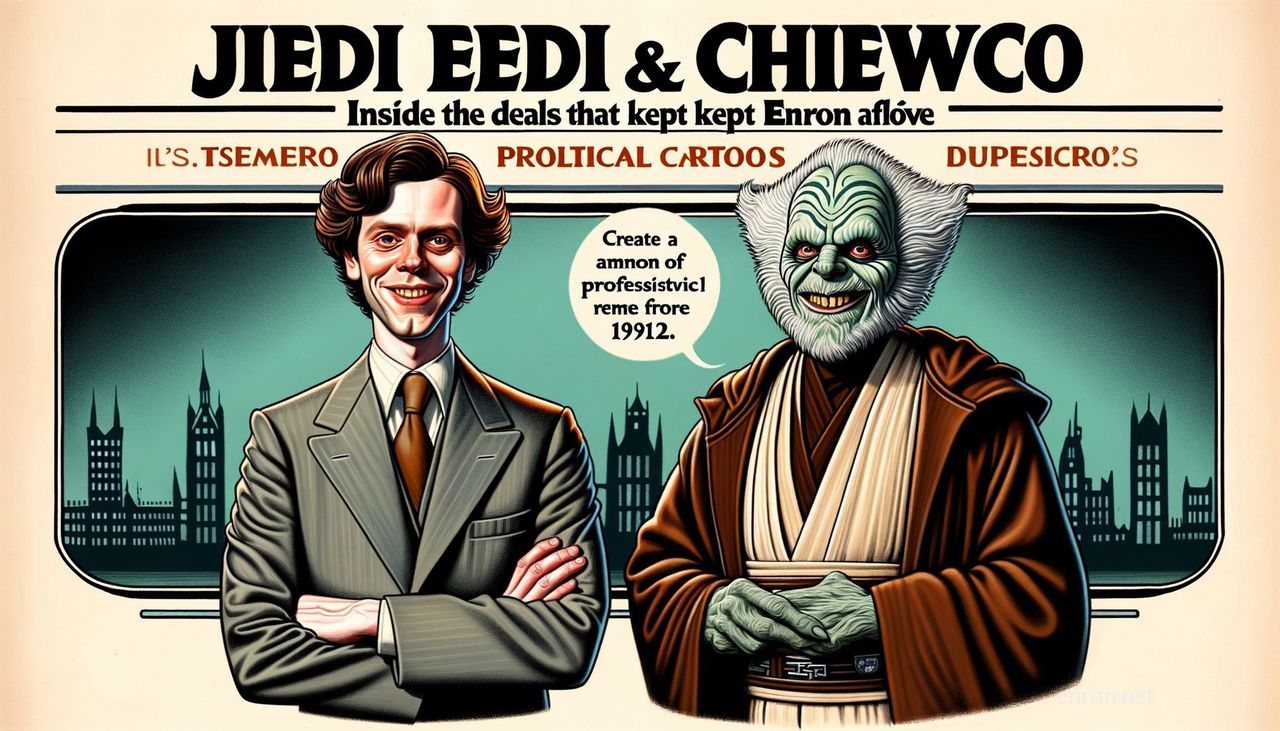JEDI and Chewco: Unmasking Enron's Financial Mirage

The Covert Transactions That Propped Up a Corporate Giant
JEDI and Chewco: A Case Study. Inside the Deals That Kept Enron Afloat
"All the world's a stage," Shakespeare wrote, and it was on this stage that Enron's remarkable financial tragedy unfolded—a cautionary tale of corporate greed, misconduct, and the intricate web of deceit that ultimately plunged the energy giant into oblivion. Among the many densely knotted threads in the Enron scandal, the names "JEDI" and "Chewco" loom large. These deals, ingeniously crafted off-books entities, played a pivotal role in maintaining the façade of Enron’s financial health during the late 1990s. What follows is the story of JEDI and Chewco, two characters in a convoluted play of corporate chicanery that epitomizes the depths of Enron's deception.
The Birth of JEDI: An Intergalactic Exploitation
JEDI—short for Joint Energy Development Investments—was created in 1993 as a partnership between Enron and the California Public Employees' Retirement System (CalPERS). The project's name wasn't a mere gimmick borrowed from the Star Wars saga; it was emblematic of the audacious and ambitious opportunities that Enron sought to chase in the energy markets.
CalPERS invested $250 million in JEDI, with the goal of developing energy-related investments. Enron managed the partnership, declaring it off its balance sheet, ostensibly to minimize risks and control investments in an orthodox manner. For Enron, this was a strategic maneuver to keep debt unobtrusive and earnings bolstered. For a time, it seemed to be a mutually beneficial arrangement—until the shadows lengthened.
The Enigma of Chewco: A Smoke and Mirrors Performance
By 1997, Enron was feeling the tightening grip of multiple financial commitments. It needed to keep debt off its books while maintaining strong financial appearances. Enter Chewco—an entity named whimsically after Chewbacca, Han Solo's fur-covered co-pilot from Star Wars. If JEDI was the bravado, Chewco would be the elaborate cloak-and-dagger maneuvering that masked the Sith-like underbelly of Enron's financial dealings.
Chewco was orchestrated primarily by Enron executive Michael Kopper and was formed to buy out CalPERS' share in JEDI for approximately $383 million. Herein lay the crux of dark ingenuity: through a labyrinthine lattice of loans and investments from other entities, spearheaded largely by Barclays Bank, Chewco was crafted, thereby allowing Enron to claim that it had found an independent partner. In reality, Chewco was still deeply entwined with Enron, a marionette controlled behind a thin veneer of legitimacy.
The Web Unravels: Dissecting the Deals
The tangled whorl of the JEDI and Chewco deals became increasingly convoluted, with money being shuffled back and forth to disguise the intrinsic lack of independence that these entities purported to have. By using Chewco to "buy" the interest held by CalPERS, Enron sidestepped the necessity of recording significant debt on its balance sheet. Moreover, performance fees and "profits" from these off-books partnerships conveniently inflated Enron's reported financial health.
However, the brilliance that seemed to shine from the concept was nothing more than the glint off a house of falling cards. Fundamental regulations governing Special Purpose Entities (SPEs) were shamelessly flouted. For SPEs to reside off a parent company's books, the entities were required to have a minimum of 3% of “outside” equity, independent of the parent. Chewco failed this stipulation spectacularly. Despite appearing to possess the requisite outside equity, most funding for Chewco emanated from Enron's own channels, directly or indirectly.
The Curtain Call: Discovery and Demise
By the early 2000s, cracks were beginning to show through the carefully curated facade. Chief Financial Officer Andrew Fastow's complex SPE network came under scrutiny as investigators and stakeholders started unwinding the labyrinthine pathways that perpetuated Enron’s apparent profitability.
The revelations surrounding JEDI and Chewco were pivotal in the eroding trust and unraveling financial sanity within Enron. These structures held vast sums that were deceptively labeled as off-balance-sheet transactions when, in essence, they masked one of the most profound cases of corporate fraud in history.
In 2001, when Enron's scandal broke wide open, it illustrated a lesson to the world about the consequences of unchecked financial artistry. The once-celebrated company plummeted into bankruptcy, and its senior executives faced legal retribution. Kenneth Lay, Jeffrey Skilling, and Andrew Fastow, among others, embodied the price of deceptive ambition and the fallacy of foregoing transparency.
Epilogue: Lessons in Transparency and Oversight
The saga of Enron’s JEDI and Chewco is emblematic of the dangerous terrain where aggressive business ambitions converge with unscrupulous financial practices. These entities were not just numbers on a balance sheet or notations in a ledger; they were symbols of a broader ethical erosion that underscores the necessity for rigorous oversight, transparency, and corporate governance.
As industries evolve and deal-making becomes increasingly sophisticated, the Enron chronicles impart necessary caution to investors, regulators, and corporate leaders. No empire is invincible when founded on deception. JEDI and Chewco will remain stark and somber studies in the annals of financial history—reminders of the fragile line between ingenuity and infamy.